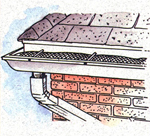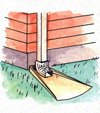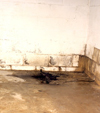For decades, thousands of satisfied homeowners have relied on The B-Dry System to solve their wet basement problems.
For more information, immediate assistance or a free estimate, select one of the options below.

Preventing Basement Water Problems
Rain Gutter Cleaning and Maintenance - Keeping your rain gutters clean will go a long way in preventing water problems and the damage it can cause. Set up a schedule at least two or three times a year to check your rain gutters, clean out any debris and repair any problems.
You want to make sure they are not blocked, even if you have gutter screens. Gutter guards can go a long way to control debris and leaves from entering but they can still become blocked. Run your garden hose through them to make sure they drain properly.
Most rain gutter installation companies offer a service to clean out your gutters periodically. This can be great for homeowners with a busy schedule, people who forget easily or who find it cumbersome to do this type of maintenance.
Extend Downspouts Away From Your Home - Extend your down spout leader pipes 10 to 20 feet past your foundation. Try to empty them on a part of your property that slopes away from your home.

Don't bury your down spout pipes into a drywell. Drywells have a limited capacity and will be quickly filled with regular ground water as well as water from your downspouts. Once the drywell fills up, your gutters will backup and start spilling roof water directly against your foundation.
You can extend your down spouts underground as long as the end of the pipe comes out somewhere. You must be able to see the end of your gutter pipe for it to completely drain out.

Run water from your garden hose through the underground extensions at least once a year to flush out leaves, rodent nests and other debris. Screens don't work well on the end of underground gutter lines because they can trap leaves inside and become blocked up.
Don't connect your downspouts to your sewer system. If your sewers ever backup, you'll have a massive problem as all the additional roof water pours inside your basement.
Identify Potential Surface Water Problems - Walk around the outside of your home during a storm to see where the surface water runs or collects. The best situation is where the land directly against your home slopes outward and away from the home. Surface water should run around your home to a lower point where it will drain off and not cause problems. Dependable basement water control is dependent on several factors.
An experienced landscaper can usually do some minor surface contouring to control your surface water. Sometimes a contoured shallow trench or swale can direct your water away without a great expense.
Be careful about installing surface drains or surface trenches filled with gravel. Leaves in the Fall or snow and ice in the Winter can block surface water entry. If water can't seep below the ground to drain away, you'll continue to have surface water problems. Preventing basement water damage is a little bit of work but well worth it.
Set Your Dehumidifier To Run Automatically - Your dehumidifier should be set at the desired humidity level and left alone. It is not necessary to adjust your dehumidifier throughout the year. When humidity levels rise, your dehumidifier will automatically turn on and lower the humidity.
If you have a collection pan that requires emptying periodically, get a drain hose attachment instead. Adding a drain hose is a minor investment, usually less than $10, and will ensure that your dehumidifier runs as often as necessary during more humid seasons. The water will simply run into a floor drain or sump pump. If you don't have a floor drain or sump pump, buy a condensate pump to discharge the water.
Windows & Doors Should Be Kept Closed - All Year! - Most homeowners are tempted to open all the windows to let in some fresh air. In your "upstairs" rooms, this is fine but not in your basement. Because your basement is below ground level, it will stay naturally cooler than the upstairs or air outside.
Warmer air shrinks as it enters the basement and causes a higher humidity level and condensation problems. The higher humidity and condensation are readily absorbed into everything porous, creating unpleasant and unhealthy odors.
Keeping your doors and windows closed will also save you money on electricity because your dehumidifier will run less.
More Helpful Information
You can get a free evaluation of your problem through a host of companies in different home-related industries.
Most landscapers, excavation contractors, basement waterproofing companies and rain gutter installers will evaluate your problem, give you some ideas and provide a free estimate for the services they can provide. Be aware though, that many companies offering a "free estimate" will also try to sell you on their particular products and services. To get accurate information, ask for several opinions and estimates before you decide on the best fix for your particular problem.
You can also get an evaluation from a professional engineer or home inspection company but there will be a cost involved for their services and opinion. As some areas don't require home inspectors to be licensed, check their credentials carefully.
You can check out companies' reputations by going to www.BBB.org, the website of the Better Business Bureau.
You can also check with your State Attorney General's office or Bureau of Consumer Protection for any problems a particular company may have experienced.
Ask companies for references from people they have helped with problems which are similar to yours.
Any contractor should gladly agree to give you a Certificate of Insurance before beginning work on your home. There is no extra cost involved for the contractor or the homeowner. If a contractor is hesitant to provide this, chances are that he has no insurance. Look elsewhere!
© 2017 B-Dry Owner's Association
RECOMMEND THIS PAGE